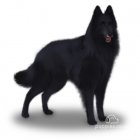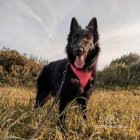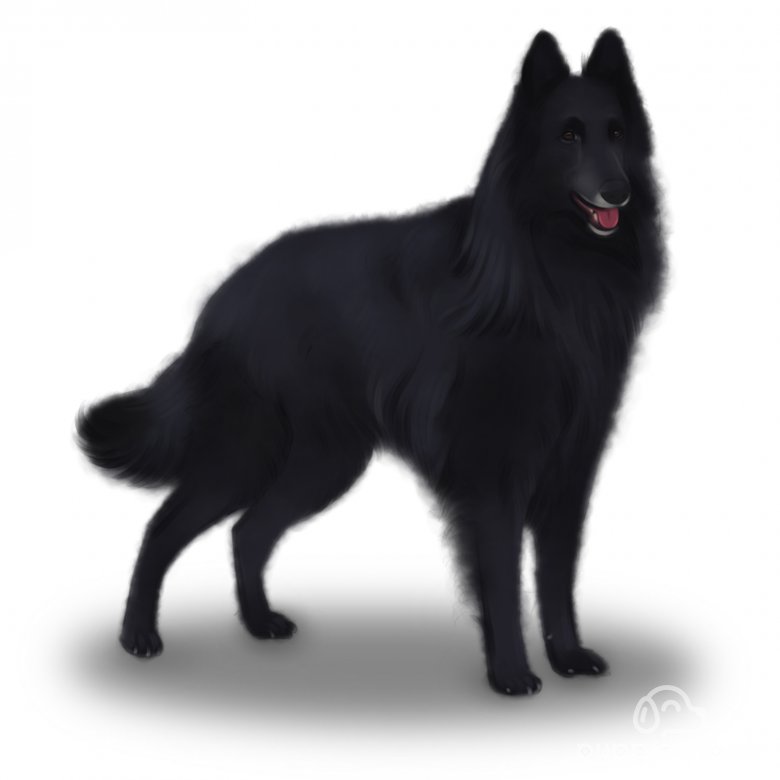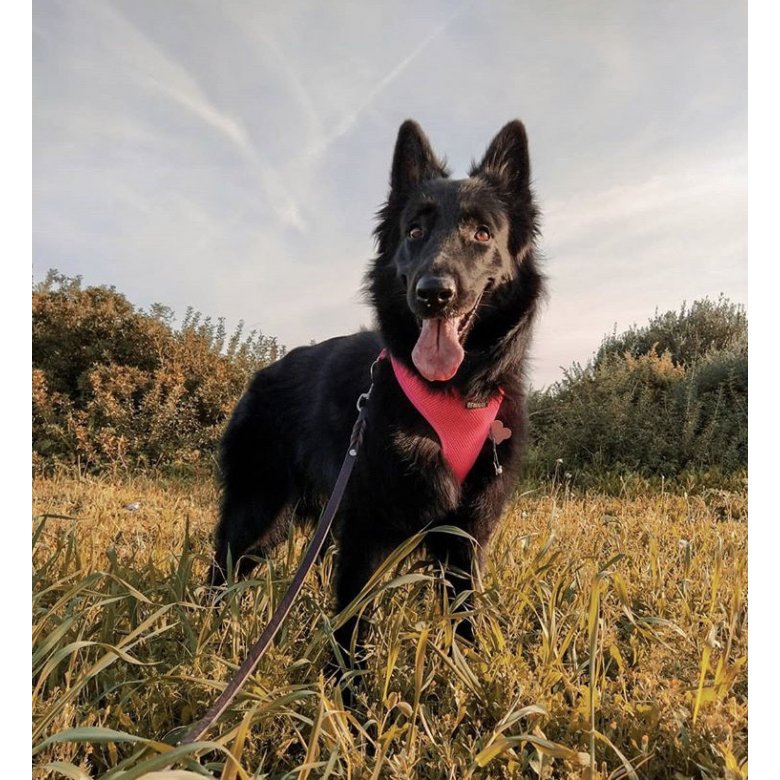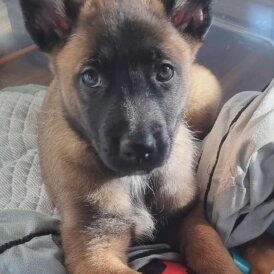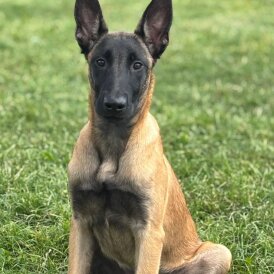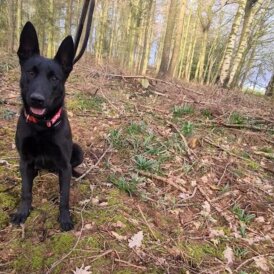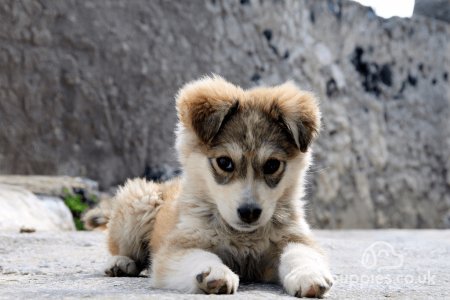Of the four types of Belgian Shepherd Dogs, the Groenendael variety is a pastoral working dog from Belgium. Groenendael puppies are an excellent choice for active, outdoors-oriented owners and are renowned for their hard-working and trainable qualities but also their affectionate and loving bonding with owners and families. Groenendael puppies are intelligent and can be trained to be obedient and prudent guard dogs and loving companions. Few breeds are as popular in the armed forces and police units as the Belgian Shepherd Dog, and the Groenendael has proven itself in the line of duty time and time again due to its superb characteristics.
Why Belgian Shepherd Dogs are Great
Some highlights of Belgian Shepherd Dogs:
Intelligence: the Belgian Shepherd Dogs is an intelligent breed and can perform many duties with ease.
Watchdogs: Belgian Shepherd Dogs are naturally excellent watchdogs and can make superb guard dogs as well.
Trainable: this breed can learn an impressive number of commands and can be taught easily.
Active: Groenendaels love to play many canine sports and can keep owners and family members active and healthy as well.
Family-friendly: this breed tends to get along quite well with owners and their families and they will act as natural protectors in the event of danger.
Things to Consider when Looking at Belgian Shepherd Dogs for Sale
Some downsides to the Belgian Shepherd Dog:
Exercise: Groenendaels require plenty of exercise every day in order to remain stimulated and healthy.
Apartment-friendly: this large breed doesn’t tolerate confined spaces and small apartments. Owners should have plenty of space to accommodate them.
Aggression: Groenendaels have a strong prey drive and they may chase, chew, or nip at heels, especially if bored.
First-time owners: this breed sometimes shows signs of stubbornness and as such may not be the most ideal puppy choice for first-time owners.
History of the Belgian Shepherd Dog
As a pastoral breed, Belgian Shepherd Dogs have long served on farms and pastures performing shepherding duties as well as working duties of all sorts on farms. The Groenendael variety of Belgian Shepherd Dog is recognised in Belgium and elsewhere, including by the Kennel Club of Great Britain, as being one of four separate varieties of the same breed. The origins of this breed can be traced back to the Middle Ages in Belgium, where many breeds of working, pastoral dogs were a common sight in the rural landscape. During the late 19th century, a large selection of these dogs were categorised and analysed by Belgian veterinary school Professor Adolphe Reul. The Groenendael was one of the four varieties of Belgian Shepherd Dogs identified and differs from the others by its long black coat of fur.
Appearance
There are four recognised varieties of the Belgian Shepherd Dog breed. Belgian Shepherd Dogs can be identified by their attentive, alert, and well-proportioned physique. They exude strength and have muscular bodies and hindlegs and may look as though they are always on guard. The Groenendael variety of Belgian Shepherd Dog is distinguished from the other three, the Tervuren, Laekenois, and Malinois, by its long and thick double coat of straight and harsh black fur.
How big is the Belgian Shepherd Dog?
Belgian Shepherd Dogs are medium-sized dogs. Males grow on average to 60-66 cm in height, whilst females can grow up to 56–62 cm high.
How heavy is a Belgian Shepherd Dog?
Fully-grown adult male Belgian Shepherd Dogs weigh between 25-30 kg on average. Females weigh between 20-25 kg on average.
What colour is the Groenendael?
The Groenendael variety of this breed has the following commonly-accepted coat colours:
No other colours are permissible. A uniform black coat of fur is what distinguishes the Groenendael from the other three varieties of Belgian Shepherd Dog.
Temperament
Belgian Shepherd Dogs of all varieties share the same temperament and differ only in their appearance. Thus, the Groenendael is known for its alert and natural watchdog ability. He is an intelligent and sensitive breed that gets along well with other families, but can easily follow its prey drive and chase other pets and may also nip or chew. Therefore, proper training as a puppy is essential. Luckily, training Groenendaels is not difficult due to their high intelligence and their ability to learn commands quickly. This is one of the reasons why armed forces and police units worldwide employ these brave and fearless dogs. Bear in mind that this breed requires plenty of exercise and is best adapted for large, open areas rather than small homes or apartments.
Do Belgian Shepherd Dogs make good guard dogs?
Few breeds make as excellent a watchdog as the Belgian Shepherd Dog. They do not need to be taught to watch since this is innate in their temperament. They can be trained to act as guard dogs and can perform this task well.
Do Belgian Shepherd Dogs bark a lot?
As a natural watchdog, Belgian Shepherd Dogs will bark to alert owners of suspicious activity. They may also bark around strangers or other pets. Compulsive barking is not common and can be avoided by providing proper training from puppyhood.
Are Belgian Shepherd Dogs easy to train?
Belgian Shepherd Dogs are exceptionally easy to train. They can learn obedience and to perform many commands with little repetition required.
Are Belgian Shepherd Dogs playful?
This breed is playful, especially as puppies. They enjoy outdoor activities and canine games where they can run and roam freely.
Are Belgian Shepherd Dogs good with children?
Belgian Shepherd Dogs are generally good with children, but they should be supervised whilst playing since they have a tendency to nip at the feet.
Are Belgian Shepherd Dogs good with other pets?
Although they are not aggressive, Belgian Shepherd Dogs can chase other pets and engage in boisterous play that may harm other pets. Puppies should always be introduced to other dogs gradually and should not be permitted to become dominant or aggressive with them. Smaller pets are not ideal to have around the home since Belgian Shepherd Dogs have a high prey drive.
Can I leave a Belgian Shepherd Dog alone?
This breed can tolerate moderate amounts of isolation, but they should never be neglected. Belgian Shepherd Dogs can become bored quickly and may also chew carpets or furniture if left alone for too long. Avoid this by having a family member around the home at all times.
Do Belgian Shepherd Dogs like water?
This breed tends to enjoy swimming and may jump in the water without hesitation. All puppies should be introduced to water on their own, however, since some are frightened of the water and may become traumatised if they haven’t become comfortable in water.
Health
How long do Belgian Shepherd Dogs live?
Generally, Belgian Shepherd Dogs are expected to live anywhere from 10-14 years.
How much exercise does a Belgian Shepherd Dogs need?
This breed has very high exercise requirements. At a minimum, two hours per day are recommended to keep your Belgian Shepherd Dog mentally and physically stimulated. Take him out for a brisk morning walk and spend an hour in the evening playing ball or other canine sports with him.
What are a Belgian Shepherd Dog’s common health issues?
Belgian Shepherd Dogs tend to be a relatively healthy breed, but they are nevertheless susceptible to a few common health issues such as:
Hip dysplasia;
Epilepsy;
Bloat;
Eye infections;
Dermatitis.
Care
How much space do I need for a Belgian Shepherd Dog?
Large, open spaces are ideal for a Belgian Shepherd Dog. This breed will not tolerate living in small, confined homes or apartments. A large, fenced garden is also necessary to satisfy their high exercise requirements.
What should I feed my Belgian Shepherd Dog?
A fully-grown Belgian Shepherd Dogs should be fed 2 to 3 cups of high-quality dog food every day. Puppies should eat a little less than this amount. Adjust as necessary to promote good health and to prevent overfeeding.
How much grooming do Belgian Shepherd Dogs need?
Belgian Shepherd Dogs of all varieties require a moderate amount of grooming. Although their hair doesn’t need to be trimmed very often, their thick undercoats will need to be brushed at least once per week to promote healthy growth and to remove any knots, tangles, or debris caught in their fur.
Do Belgian Shepherd Dogs shed?
This breed sheds a moderate amount, which can become excessive during Spring and Autumn. Brush them at least once per week to remove dead hair.
Average Costs
How much does it cost to keep a Belgian Shepherd Dogs?
As a rough guide in pricing: Cost to buy: roughly £500-650 for a well-bred Groenendael puppy Other costs (Vet, Food etc): £70-110 per month
Specific Buying Guide
You can read our general buying guide here, with the most important thing being going to view your Groenendael puppy, seeing it with its mother, and checking the quality of the breeder. More specifically, here is some Groenendael puppy buying advice:
Groenendaels are distinguished from other Belgian Shepherd Dogs by their long coat of uniform black fur. If any reddish tinges or grey breeches are found in the coat, the puppy is undesirable as these are considered to be serious flaws. Only black is permissible for Groenendaels.
Belgian Shepherd Dogs are best suited for families living in large, open areas where the breed’s high exercise requirements and tendency to keep watch can be best put to use. If you’re unwilling to put in the effort required, consider purchasing a different puppy breed with less maintenance requirements.
Other Reading, Adopting Groenendael Puppies and Rescue Organisations
A big thank you to the following sources who helped to shape this article: Belgian Shepherd Dog Association of Great Britain: https://www.bsdaofgb.co.uk/belgian-shepherd-rescue Kennel Club of Great Britain: https://www.thekennelclub.org.uk/services/public/breed/display.aspx?id=5111 UK Dog Trust: https://www.dogstrust.org.uk/ Blue Cross: https://www.bluecross.org.uk/rehome-pet Federation Cynologique Internationale: https://www.fci.be/Nomenclature/Standards/015g01-en.pdf






